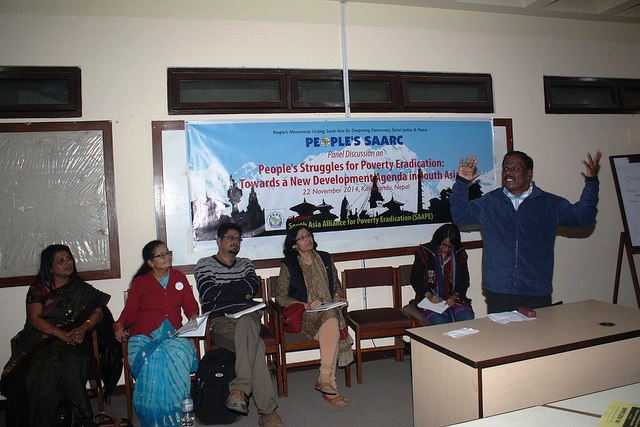SAAPE, in addition to being a member of the organising committee of the People’s SAARC Regional Convergence 2014, also hosted a panel discussion on 22 November 2014. The title of the discussing was “People’s Struggles for Poverty Eradication: Towards a New Development Agenda in South Asia.” The seven panellists were Dr. Dilli Raj Khanal (Nepal), Shanaz Sumi (Bangladesh), Nalini Rathnarajan (Sri Lanka), Farooq Tariq (Pakistan), Sushovan Dhar (India), Raz Mohammad Dalili (Afghanistan) and Zakia Soman Zowhar (India).The panel discussed about how we can mobilise people’s campaigns and movements to eradicate poverty.
Dr Dilli Raj Khanal, lead author of SAAPE’s Poverty Report: Crisis and Vulnerability in South Asia, was one of the speakers who introduced the aforementioned report published in 2013. He highlighted the necessary role of the people of the region to come out of the pervasive poverty. Similarly, other speakers presented on the state of poverty in their respective countries while highlighting the limited role of the government in addressing the issue and the vulnerable state of women who are prone to the vicious cycle of poverty. Ms Shanaz Sumi briefing about the condition of women in Bangladesh asserted that women’s issues should be firmly incorporated in the Post-2015 Development agenda. Likewise, Ms Nalini Rathnarajan mentioned that women in Sri Lanka are the ones most affected by the civil war and they have often been left out in the post conflict integration process. Dr A. S. Chandrabose who was representing plantation workers in Sri Lanka, also highlighted the frail situation of plantation workers in the country. Although the Sri Lankan government claims that 95% of the rural community in Sri Lanka has houses, this does not apply to the plantation workers who mostly live in temporary houses in the plantation areas itself. Furthermore, 25 % of the plantation workers are not educated which has caused hundreds of them to migrate to Gulf countries like Saudi Arabia to work in hopes of earning a better salary. Mr Farooq Tariq talked about the role of the state and its responsibility towards the people. Often the elected officials in South Asia take advantage of the people and use religion as a leverage to put fear in people’s mind to be elected into power. On the other hand, Mr Sushovan Dhar emphasised on the structural nature of poverty in South Asia. Poverty exists because there are rich people who want to maintain structures that keep the poor in a state of perpetual poverty. Similarly, Mr Raz Mohammad Dalili stressed that Civil Society Organizations have not been able to challenge the policies imposed by the West in South Asia. We need to be wary of the direction South Asian policies are taking. Zakia Soman Zowhar also expressed that neoliberal policies have had a negative impact upon conditions of people in India.
A general consensus was reached in that the existing economic systems which are dominated by predatory neoliberal ideology need to be reformed. People’s movements need to be organised to collectively fight to bring changes in the current system which perpetuates poverty in the region.
More than 70 participants from 11 countries participated in the discussion. Ms Sita Paudel, All Nepal Women’s Association (ANWA) facilitated the discussion.



